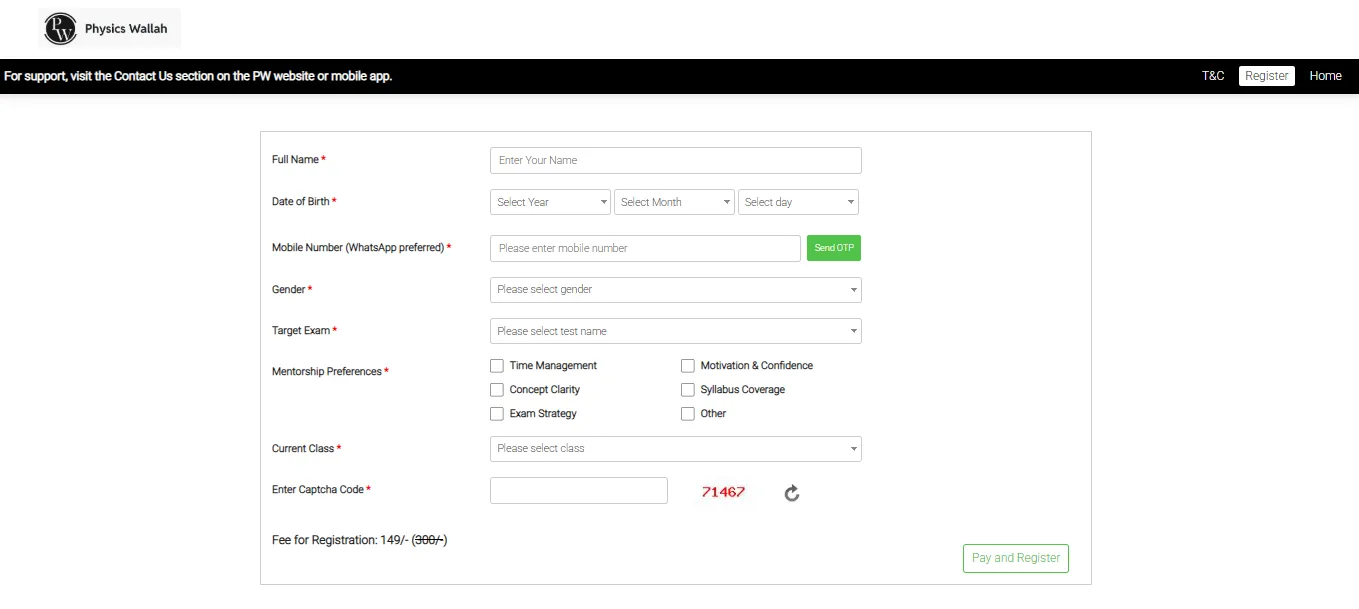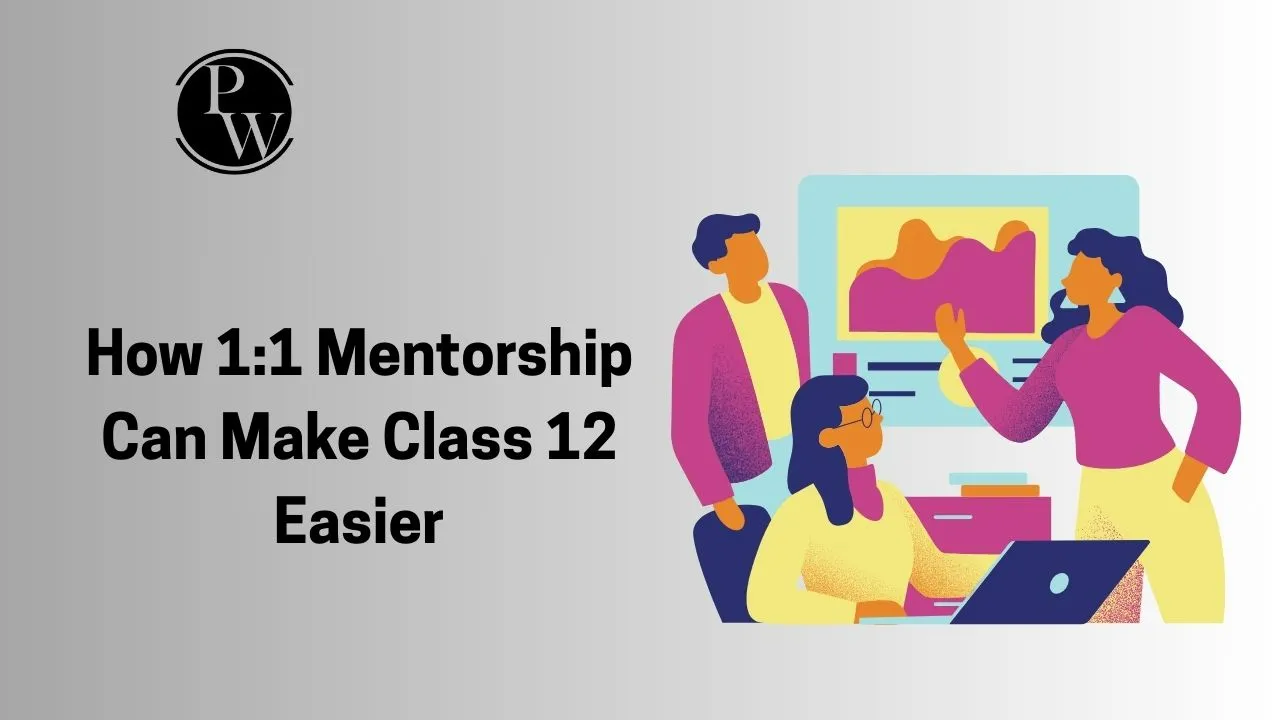
The Impact of 1:1 Mentorship on Class 12 Students Performance: Class 12 is a crucial turning point in a student’s academic journey. It’s the year when students prepare not only for their board exams but also for competitive entrance exams like NEET and JEE. With the pressure of scoring well and making the right career choices, many students feel overwhelmed. This is where one-on-one mentorship can make a significant difference.
What is 1:1 Mentorship?
1:1 mentorship is a personalized guidance program where a student is paired with an experienced mentor who provides support tailored to the student’s individual needs. This support can include academic planning, emotional encouragement, strategy building, and consistent tracking of progress. The mentor acts as a coach, guide, and motivator—helping the student stay on track throughout the year.
PW Disha One-on-One Mentorship Program for Boards
The PW Disha One-on-One mentorship program for students is created to support Foundation students who need personalized attention and proper direction during their academic journey. In this program, each student is matched with a mentor who understands their academic needs and learning pace.
1. Time Management
One of the biggest challenges Class 12 students face is managing time effectively. Between school, tuition, self-study, and revision, things can get hectic. Mentors help students build a realistic timetable that balances all their responsibilities, ensuring they stay productive without burning out.
2. Boost in Motivation & Confidence
It’s easy to lose motivation, especially when faced with tough topics or low marks. A mentor provides constant encouragement, celebrates small wins, and helps students overcome failures. This emotional support boosts students’ confidence and keeps them going even when things get tough.
3. Customized Study Strategy
Every student is different, some struggle with Physics, others with Maths or Biology. Mentors help design customized strategies based on the student’s strengths and weaknesses. This includes making subject-wise plans, prioritizing important topics, and setting achievable targets.
4. Syllabus Coverage & Exam Preparation
Mentors track a student’s progress regularly and adjust the study plan if needed. They also help with exam-specific preparation and working on time management during exams.
How Mentorship Builds Confidence?
Confidence is key to academic success. Many students experience fear or self-doubt during their Class 12 year, especially when they face difficult subjects or receive low scores. A mentor helps by offering consistent encouragement, personalized feedback, and a safe space to ask questions.
Through regular mentoring sessions, students begin to believe in their abilities. They gain clarity on concepts, understand their mistakes, and become more proactive about learning. This self-assurance helps them perform better in both school and competitive exams.
The Emotional Support System: Mentorship for Mental Well-being
While academic success is important, mental health cannot be overlooked. The stress of expectations, competition, and performance can lead to anxiety or burnout. Mentors act as emotional anchors trusted individuals students can open up to and rely on.
They help students:
-
Manage stress and anxiety
-
Balance emotions during high-pressure periods
-
Develop a positive mindset toward exams and results
-
Stay resilient in the face of failure
This emotional support system improves students’ overall well-being and helps them stay calm and focused.
The Power of Encouragement
Sometimes, a few kind words are all a student needs to push through a tough phase. Mentors continuously uplift their mentees by celebrating progress, however small it may be. This positive reinforcement builds momentum.
Encouragement not only boosts self-esteem but also instills a growth mindset—helping students stay motivated, even when they struggle. This consistent push creates a habit of disciplined effort and long-term commitment.
Why Time Management is Crucial for Class 12 Students?
Time is one of the most limited yet crucial resources in Class 12. With multiple subjects, revision needs, practice tests, schoolwork, and coaching sessions, students often struggle to juggle everything. Poor time management leads to missed deadlines and incomplete preparation.
Mentorship helps solve this problem by:
-
Identifying time-wasting habits
-
Structuring daily, weekly, and monthly study schedules
-
Allotting sufficient time to weak topics
-
Ensuring time for revision and mock tests
Effective time management helps students stay on track and avoid last-minute panic.
How Mentorship Helps with a Balanced Study Plan?
Studying all subjects with equal focus is essential, but students tend to prioritize subjects they enjoy or find easier. This creates imbalance and can negatively affect overall scores.
Mentors help create balanced plans by:
-
Distributing subjects across the week
-
Adjusting the schedule based on performance and exam dates
-
Mixing theory-heavy and practice-based topics
-
Incorporating time for breaks and physical activity
A well-balanced plan ensures complete coverage without mental exhaustion.
How 1:1 Mentorship Helps Personalized Study Plans?
Each student has unique strengths, weaknesses, and learning preferences. 1:1 mentorship allows for the creation of completely customized study plans. These are not generic timetables but strategic roadmaps designed for individual success.
Mentors personalize study plans by:
-
Prioritizing weaker subjects or chapters
-
Aligning with the student’s school and coaching timelines
-
Tracking progress and updating plans regularly
-
A well-structured plan includes breaks, hobbies, and time for relaxation—helping students avoid burnout and stay productive.
This personalized approach maximizes output and improves learning efficiency.
Complete Syllabus Coverage
One major reason students underperform is incomplete syllabus coverage. Mentors ensure that no topic is left untouched by building a structured learning journey. They break the Class 12 syllabus into achievable weekly targets, track completion, and conduct regular reviews.
Complete syllabus coverage includes:
Chapter-wise Planning: Mentors help students focus on Class important chapters first, based on weightage and Class 12 exam patterns.
Concept Clarity: Difficult topics are explained in a simple way so students can understand and remember them better.
Concept Clarity: Difficult topics are explained in a simple way so students can understand and remember them better.
By ensuring that students cover every topic in time, mentors eliminate last-minute cramming and increase retention.
How to Enroll for the PW Disha 1:1 Mentorship Program by PW
Students aiming to boost their academic performance in Class 12 can easily enroll in the 1:1 Mentorship Program by PW by following these simple steps:
Step 1:
Go to the official registration page: PW's Disha One-on-One Mentorship boards Program
Step 2:
Fill in your basic details, including:
-
Full name
-
Date of birth
-
WhatsApp mobile number
-
Gender
-
Target exam (select “Class 12 Boards”)
Step 3:
Choose your mentorship focus areas such as:
-
Time management
-
Exam preparation strategies
-
Syllabus coverage
-
Confidence building
-
Mental well-being
-
Motivation and consistency
Step 4:
Proceed to pay the session fee to complete your registration. Once registered, you will be able to schedule and attend your 1:1 mentorship session with an expert mentor via an online call.
Foundation 1:1 Mentorship Program by PW: Pricing Details
Students preparing for class 12th exams can enroll in the 1:1 Mentorship Program by PW for just INR 149. This small step can make a big difference in how students approach their studies, manage time, and stay focused.
By joining the program, students get individual attention and guidance from someone who understands the foundation journey. It’s an opportunity to stay consistent, clear doubts, and receive the right direction at the right time.
Benefits of Mentorship
Mentorship provides several key benefits to students at any stage of their academic journey:
Guidance: Mentors help students tackle their academic challenges and grow both personally and academically.
Better Learning Outcomes: With one-on-one attention, mentors help students understand and remember lessons more effectively.
Better Career Choices: Mentors help students identify their strengths and interests, helping them make informed decisions about their future career paths.
Skill Development: Mentors help students build important life skills like time management, critical thinking, and problem-solving, which are important both academically and in life.
Impact of 1:1 Mentorship on Class 12 Students FAQs
What is 1:1 mentorship?
Can 1:1 mentorship help with exam preparation?
How does the Foundation mentorship session work?
How can I join a 1:1 mentorship program for Class 12?







